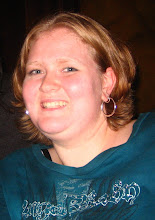The last couple of days were spent with my family rather than on doing 'research' per se... Believe me, it was worth it!
I got to see a ton of my family since my youngest aunt and her husband brought their newest daughter up from NC to be baptized this weekend. Almost all of my aunts and uncles were there, as were a bunch of my cousins. My cousins and I range in age from about 32 to 3 mo old, and now there are 25 of us, I think. And some of my cousins are having babies now, too. It's been a crazy fun couple of days hanging out and playing together...
Spending so much time with my family, especially with my grandma (who is actually my dad's stepmom, though more grandma to me than anyone else), has made me think a lot about a book I'm reading for my research. The book is called Tattooed in the Cradle by Lamont Satterly. The book is about family legacies and how one's family history affects the adults we grow into. It says that family legacy (values, rules, beliefs, traditions, etc) are both taught and caught. This means that some of a family's ideas about money or religion are taught, while other things like the roles of men and women, and the importance of education/getting a good job are caught. It's made me think a lot about what our family legacy is, about what we consciously acknowledge as part of our family tradition, and what we're passing on to these new babies that is unspoken.
This book also talks about patterns and experiences that occur early in life that impact adults as they grow older. It says, very adamantly, that the trauma, abuse, neglect, victimization, or disapproval a child experiences develops the filter that they spend the rest of their lives living through. And Satterly says that it doesn't really matter how "true" the claims of victimization are, what matters is what the person believes was true for them, what they feel they experienced.
In thinking about this, then, in correlation with my project, it's important that pastors, churches, and other Christian organizations not only work to support [young] adults who feel that they've experienced some form of trauma in childhood, but that they also work diligently to prevent these destructive experiences from happening, or at least from festering underneath the surface for years upon years. And it's helpful for church leaders, when working with at-risk or troubled youth, to get to know the young person's family history, because it can help to explain some of the nuanced, contextual differences in 'risk' that that particular young person is facing.
After just one week of this FTE project, I think I can tell that I am going to learn a lot more about myself (reflecting on my own family history and experiences with church) than I will about anything else... I think it'll be an important step in me improving my skills at ministering to at-risk young people.
Subscribe to:
Post Comments (Atom)


2 comments:
Alexis, did you read the article "Life leaves marks" by Richard W. Swanson in the April 2008 issue of the Lutheran? Swanson describes how Jesus' early experience as a refugee--a 'violent beginning'--in Matthew's Gospel, may explain the moralistic rigor of Matthew's Jesus. "Jesus orders people to cut off feet or hands rather than yield to imperfection." He posits that the resurrection changes Jesus from someone who makes "sharp divisions," to someone who "embraces the whole mixed lot." I wonder how the resurrection will change us and the legacies we carry?
I hadn't read that article, Drew, but thanks for pointing it out. It sounds interesting...
How will the resurrection change us and the legacies we carry... wow... good question! I think that as we live into the resurrection in this life, we will be changed by the power of life and reconciliation. My hope and prayer is that God's grace is strong enough to heal all of our brokenness and anxieties and fears, which include those that we've inherited and those that have helped to shape us into who we are.
I have no doubt that our past influences our present and our future, but I think that as Christians, as Easter/resurrection people, we HAVE to believe that change is possible. Freedom from our burdens is possible. Life is possible! It's why I'm still a Christian, I think. :)
Post a Comment